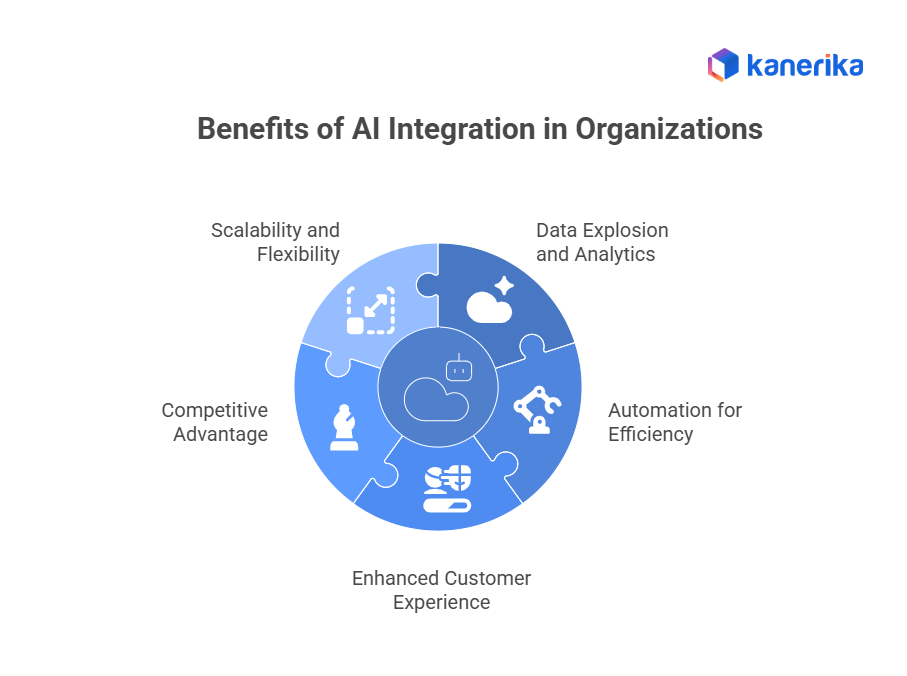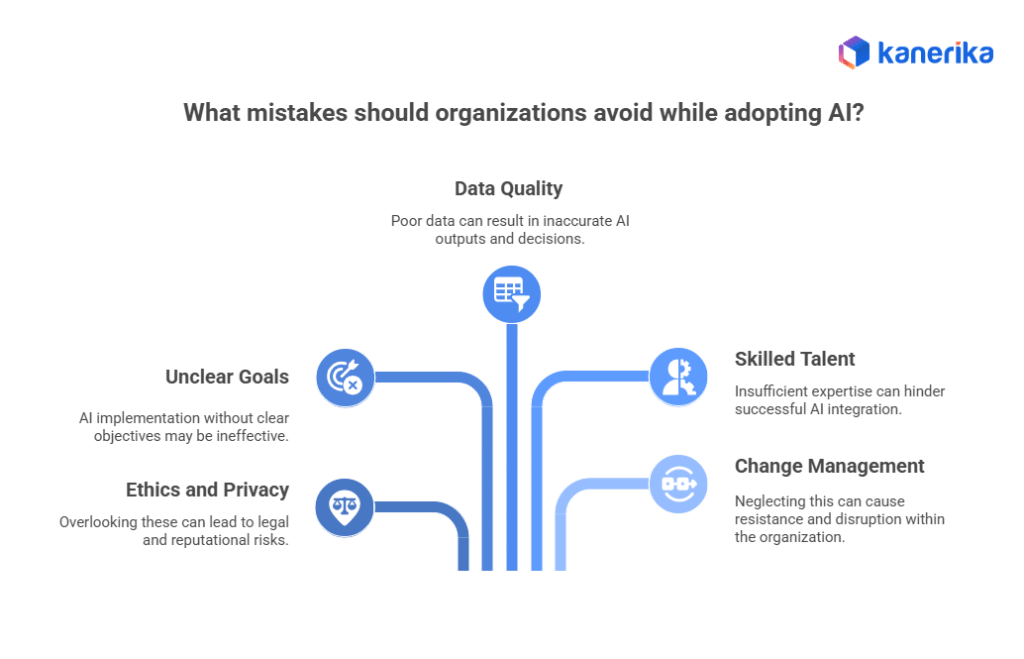In October 2025, Google Cloud launched Gemini Enterprise — a platform that lets employees chat with their company’s data, automate tasks, and run AI agents without writing code. It connects with tools like Microsoft 365, Salesforce, and SAP, making AI feel less like a separate system and more like part of everyday work. Consequently, this shift shows how fast AI is moving from isolated pilots to full-scale integration across departments.
According to McKinsey, 78% of organizations now use AI in at least one business function, up from 55% just a year ago. Around 83% say AI is a top priority, and 92% plan to increase their AI budgets over the next three years. However, only 1% of leaders claim their companies are “AI mature,” meaning AI is fully built into workflows and consistently delivering business value. The gap between adoption and impact stays wide, primarily due to poor planning, disconnected systems, and a lack of frontline enablement.
In this blog, we’ll explore how AI integration in organizations works, the key tools and strategies involved, and the benefits it brings. Continue reading to discover how AI is reshaping workflows, decision-making, and business outcomes across industries.
Key Takeaways
- AI integration builds intelligence into core business processes, automating tasks and enabling data-driven decisions.
- Finance, healthcare, retail, manufacturing, marketing, and logistics benefit from AI in fraud detection, predictive analytics, personalization, and efficiency.
- Common adoption mistakes include unclear goals, low-quality data, lack of skilled talent, poor change management, and ignoring ethics or privacy.
- Small and medium-sized businesses can use cloud AI, predictive analytics, chatbots, low-code platforms, and AI-driven CRM to get a measurable impact.
- AI agents automate tasks such as document summarization, compliance, IT support, scheduling, and data extraction to streamline workflows.
- Strong governance, cloud integration, and modular implementation ensure secure, scalable, and practical adoption of enterprise AI.
Transform Your Business with AI-Powered Solutions!
Partner with Kanerika for Expert AI implementation Services
What is AI Integration?
AI Integration in Organizations is changing how businesses operate, make decisions, and drive innovation. By embedding artificial intelligence into core business processes, companies can automate repetitive tasks, boost data-driven decision-making, and improve customer experiences. From predictive analytics to intelligent automation, AI integration helps organizations unlock new efficiencies and competitive advantages.
Modern enterprises are using AI-powered tools and machine learning models to optimize workflows, detect anomalies, and forecast trends with precision. Moreover, integration across CRM systems, ERP platforms, and cloud applications allows smooth collaboration between AI and human intelligence, ensuring smarter operations and faster insights.
Why are companies investing in AI now?
- Data explosion and analytics potential: The exponential growth of data has made AI a must for extracting valuable insights, improving forecasting, and making real-time decisions.
- Automation for efficiency: AI-driven automation reduces operational costs and minimizes human error across industries like finance, healthcare, and manufacturing.
- Enhanced customer experience: Businesses use AI chatbots, recommendation engines, and personalized marketing to deliver tailored experiences that boost satisfaction and retention.
- Competitive advantage: Early AI adopters outperform competitors by using advanced analytics, generative AI models, and process optimization to stay ahead.
- Scalability and flexibility: With cloud-based AI integration platforms such as Azure AI, AWS, and Google Cloud AI, companies can easily scale operations without major infrastructure changes.
Enterprises investing in AI integration in organizations today are not just adopting technology—they are building data-driven ecosystems capable of innovation, agility, and long-term sustainability.

Which industries benefit most from AI integration?
AI integration in organizations has proven valuable across multiple sectors, especially those driven by data, automation, and customer engagement. By embedding AI in operations, these industries boost productivity, reduce costs, and make smarter decisions.
1. Finance & Banking
AI integration in finance helps automate fraud detection, credit scoring, and risk analysis. Banks use machine learning to monitor transactions, flag suspicious activity, and improve compliance. Additionally, AI supports algorithmic trading and automates customer service, making financial operations faster and more secure.
For instance, JPMorgan Chase uses its COIN platform to analyze legal documents and detect fraud patterns. Similarly, American Express applies AI to monitor real-time transactions and predict credit risk, helping reduce losses and improve customer trust.
2. Healthcare
Healthcare organizations use AI to improve diagnostics, personalize treatment plans, and manage patient data. AI models analyze medical images, predict disease risks, and support clinical decision-making. Furthermore, integration with electronic health records (EHRs) enables doctors to access insights more quickly.
Mayo Clinic uses AI to support early diagnosis and treatment recommendations based on patient history. Likewise, GE Healthcare integrates AI into imaging systems to detect conditions such as cancer and heart disease with greater accuracy.
3. Retail & E-commerce
Retailers utilize AI to personalize shopping experiences, optimize inventory, and adjust pricing in real-time. AI helps analyze customer behavior, predict demand, and automate support through chatbots and virtual assistants.
Amazon uses AI for product recommendations, warehouse automation, and dynamic pricing. Meanwhile, Zara utilizes AI to track customer preferences and adjust stock levels across its stores, thereby improving both sales and customer satisfaction.
4. Manufacturing
AI integration in manufacturing improves production efficiency, reduces downtime, and boosts quality control. Predictive maintenance helps identify equipment issues before they fail, while robotics and computer vision streamline assembly and inspection processes.
Siemens uses AI to monitor factory equipment and optimize energy use. Similarly, Bosch applies AI in smart factories to detect defects and improve process reliability.
5. Marketing & Logistics
AI helps marketers target campaigns, analyze sentiment, and forecast demand more accurately. In logistics, AI supports route optimization, delivery tracking, and fleet management, reducing costs and improving speed.
Coca-Cola utilizes AI to analyze customer feedback and adjust its marketing strategies in real-time. Meanwhile, UPS applies AI to optimize delivery routes based on traffic, weather, and package volume, saving fuel and improving delivery times.
Which Are the Top 8 Agentic AI Companies Leading the Market?
Explore top agentic AI companies like OpenAI, Microsoft, and Kanerika shaping enterprise automation.
What mistakes should organizations avoid while adopting AI?
While integrating AI, many organizations face challenges due to a lack of a well-defined strategy, inadequate readiness, and unrealistic expectations. Avoiding these loops ensures smoother implementation, improved ROI, and sustainable success with AI integration in organizations.
- Overlooking ethics and privacy: Failing to address data security, transparency, and compliance with privacy laws can lead to serious legal and reputational damage. Organizations must set up strong ethical AI frameworks and ensure that data collection, storage, and processing are fully compliant with regulations such as GDPR and HIPAA.
- Unclear goals: Implementing AI without clearly defined objectives or measurable outcomes often results in wasted investments. Businesses should identify specific problems AI can solve—whether it’s automating workflows, improving decision-making, or improving customer experience—and align projects with business KPIs.
- Low-quality or biased data: AI systems are only as good as the data on which they are trained. Inaccurate, incomplete, or biased datasets can lead to poor predictions and unfair outcomes. Maintaining data hygiene, regular validation, and unbiased training processes are needed to ensure reliable AI performance.
- Lack of skilled talent: AI adoption requires cross-functional expertise—from data scientists and analysts to domain experts and IT professionals. Without proper talent or training, organizations struggle to manage AI systems, understand results, and scale solutions effectively.
- Ignoring change management: AI integration affects workflows, roles, and even company culture. Resistance from employees can slow down adoption if proper communication and training are not in place. Teaching teams about the benefits of AI, providing upskilling opportunities, and promoting collaboration between humans and AI can help smooth transitions.
A successful AI integration strategy requires a balanced approach that combines technology, talent, ethics, and change management to maximize business value and minimize risks.

How can small and medium businesses leverage AI effectively?
Small and medium businesses (SMBs) can implement AI integration efficiently by starting small and focusing on scalable, affordable solutions that deliver measurable value.
- Use cloud-based AI tools: Platforms like Azure, AWS, and Google Cloud provide cost-effective AI APIs.
- Automate customer support: AI chatbots can manage queries and improve customer satisfaction.
- Adopt predictive analytics: Forecast demand, sales, and customer behavior to make smarter decisions.
- Implement AI-driven CRM systems: Track leads, personalize marketing, and improve conversions.
- Use low-code platforms: Tools like Kanerika’s Flip enable faster AI deployment, helping businesses automate workflows and integrate data smoothly.
By targeting key business areas such as automation, marketing, and analytics, SMEs can achieve significant results through strategic AI integration within their organizations.
Evolution of AI Agents: From Basic LLMs to Advanced Multi-Agent Systems
Explore the evolution of AI agents from basic LLMs to advanced multi-agent systems.
Case Study 1: Enhancing Data Integration with Generative AI
Client
A leading insurance provider in Asia specializing in healthcare, travel, and accident coverage.
Challenge
The client struggled with manual data integration across emerging sources like wearable devices and electronic health records. This led to delays, errors, and compliance risks, making it hard to deliver timely insights and personalized care.
Kanerika’s Solution
• Automated data extraction and consolidation using Kafka
• Standardized data with Talend for consistency across systems
• Applied generative AI models (TensorFlow, PyTorch) to align and integrate data elements
Impact
• 30% faster decision-making
• 22% increase in customer satisfaction
• 29% reduction in fraud
• 37% decrease in claim processing time
Case Study 2: Next-Gen AI Solutions for Seamless Data Interaction
Client
A global investment bank managing large volumes of structured and unstructured data.
Challenge
Manual workflows slowed decision-making and increased compliance risks. Teams struggled to retrieve insights from RFI documents and enterprise databases.
Kanerika’s Solution
• Deployed DokGPT for unstructured document processing
• Used Karl for querying structured databases via chat-based interfaces
• Enabled secure, role-based access and scalable data interaction
Impact
• 43% faster information retrieval
• 100% role-based compliance achieved
• 35% higher workforce efficiency
Kanerika’s Role in Enterprise AI Adoption and Automation
Kanerika helps businesses embed AI into their core systems to improve decision-making, automate routine tasks, and scale operations. Using Microsoft tools like Power BI, Azure ML, and Microsoft Fabric, Kanerika builds real-time dashboards, predictive models, and automated reporting systems. These solutions support faster insights across industries like healthcare, finance, retail, and logistics.
Kanerika’s AI agents are built to automate specific tasks across legal, finance, IT, and operations. They’re trained on structured data and designed to fit into enterprise workflows without disrupting existing systems.
AI Agents for Streamlined Enterprise Tasks
- Alan summarizes long legal documents into short, usable formats
- Susan removes sensitive personal data to meet privacy laws like GDPR and HIPAA
- Mike checks documents for arithmetic errors and consistency
- Karl answers data questions in plain English, turning queries into insights
- Jennifer manages voice-based scheduling and meeting coordination
- Jarvis sorts IT support tickets and suggests quick solutions
- DokGPT extracts key info from unstructured documents for document intelligence
Kanerika also supports cloud migration, hybrid environments, and strong data governance.
From predictive analytics to marketing automation, Kanerika helps organizations forecast trends, understand customer behavior, and streamline operations. Whether it’s faster campaign execution or smarter internal workflows, Kanerika’s AI integration focuses on solving real problems with reliable, enterprise-ready tools.
Transform Your Business with AI-Powered Solutions!
Partner with Kanerika for Expert AI implementation Services
FAQs
1. What does AI integration in organizations mean?
AI integration refers to embedding artificial intelligence technologies — such as machine learning, natural language processing, and automation — into business operations and systems. It enables organizations to analyze data faster, automate repetitive tasks, improve decision-making, and enhance overall productivity.
2. How can AI integration benefit organizations?
AI integration helps organizations boost efficiency, reduce human error, and make data-driven decisions. It enhances customer experiences through personalization, streamlines workflows, and provides predictive insights that support better planning and innovation across departments like finance, marketing, and HR.
3. What are the main challenges in AI integration?
Common challenges include lack of skilled professionals, high implementation costs, data privacy concerns, and resistance to change within teams. Additionally, integrating AI into legacy systems can be complex, requiring careful planning, data readiness, and strong governance frameworks.
4. Which industries benefit the most from AI integration?
AI integration is transforming industries such as healthcare, finance, retail, manufacturing, and logistics. For example, AI assists in predictive maintenance in manufacturing, fraud detection in finance, personalized shopping in retail, and diagnostic accuracy in healthcare.
5. How can organizations prepare for successful AI integration?
Organizations should start by identifying areas where AI adds measurable value, ensuring high-quality data, and training employees to work with AI tools. Partnering with experienced AI solution providers and starting with small, scalable projects can lead to smoother and more impactful integration.









